The Last Of Us season 2 is an emotional wrecking ball
HBO's blockbuster drama charts its own brutal path.
Photo: HBO
The Last Of Us delicately crafted a surrogate father-daughter relationship between two apocalypse survivors in season one. Yes, the drama focused heavily on the dystopian setting, humanity’s vicious fight for survival, and gnarly-looking monsters. But the video-game adaptation’s action-packed debut was really anchored in Joel (Pedro Pascal) and Ellie (Bella Ramsey), who navigated horrors during a cross-country trip to get her to safety. Joel, a despondent and still-grieving dad, took orphaned teen Ellie under his wing. Through their rousing bond, The Last Of Us capitalized on the importance of fighting for family, whether blood or chosen, in the cruelest of times. The endearing duo became the show’s beating heart. And in season two, that heart gets bulldozed.
Series co-creators Neil Druckmann and Craig Mazin bring The Last Of Us Part II‘s devastating twists, new locations, and at least one major antagonist to life with guns blazing. These seven new episodes are exceptional despite pacing quibbles and a couple of tacked-on storylines meant to lay the groundwork for the future. And they deliver a crushing payoff to the thorny decision Joel made to save Ellie. Instead of letting her be a sacrificial lamb for a potential cure in the season-one finale, he went on a murderous spree in the hospital to save her life. His agony over this doesn’t trump the fact that Ellie is thriving when season two begins five years later. Yet there’s a painful-to-watch, mystifying distance between them. Their icy relationship pushes a now 19-year-old Ellie to question her own moral standing and make brutal choices. With that, The Last Of Us tells a potent coming-of-age tale that’s amplified by Ellie’s consistently cataclysmic surroundings.
Ramsey takes center stage to portray their character’s transformative journey with remarkable depth. Ellie goes through various phases of being a young adult—disdain, immaturity, love, heartache—but never loses that fighting spirit. Ramsey gives a vulnerable performance, and it’s impossible not to feel Ellie’s sorrow, anger, and grit. The show’s initial run was a worthy canvas for the actor, but season two is where they truly shine. Meanwhile, Pascal remains an equally stellar scene partner. His graying, grizzly, more patient Joel is particularly affecting when he’s confronting feelings and truths he has buried deep in his psyche. It’s compelling to watch Joel and Ellie—who is basically “the same person as him,” according to Joel’s therapist in the season premiere—engage in conversations and squabbles, with our teen giving dramatic eye rolls and our stoic dude wistfully looking into the distance.
When the series returns, the two are living in the relatively peaceful Jackson, Wyoming, township led by Tommy (Gabriel Luna), his wife Maria (the underused Rutina Wesley), and a council of other residents. Everything appears to be placid, but it’s the calm before the storm. TLOU quickly puts everybody in danger—including Dina (Isabela Merced) and Jesse (Young Mazino), an on-again/off-again couple who become close to Ellie and Joel—as threats like new types of Infected and bouts within the community itself arise. (Think barn fights, cool action sequences—one featuring a flamethrower—and more disgusting Cordyceps that are wonderfully brought to life by the show’s prosthetics department.) TLOU is violent and gory, just not as much as it was in season one.
 Keep scrolling for more great stories.
Keep scrolling for more great stories.
